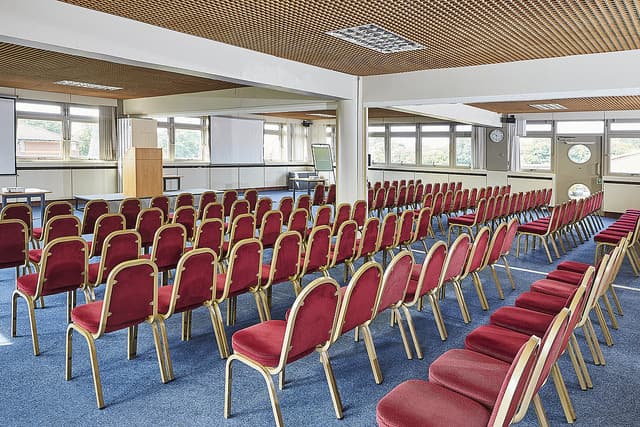
11 Handy Hints for Conference Planning
Planning a conference for your team can be a fun and exciting experience, but may also be overwhelming. From choosing the conference venue to choosing the topic of your conference, corporate meeting and event there is plenty to think about and consider, which is why we have created a conference planning checklist to help.
With 98% of event organisers planning to host at least one in-person event in 2023, it is evident that face-to-face interactions, networking opportunities, and immersive experiences remain strong. Companies can get lost in the logistics of conference planning lose the fun of the process, and become confused and tired. To ensure your next conference is a success we have created the ultimate guide for you to follow from.

Tips for Planning a Successful Conference
- Set your Goals
- Book Early
- Manage your Event Budget
- Effective Communication and Conference Planning
- Put Together an Agenda
- Engaging Content
- Fully Equipped Venue Facilities
- Organise Keynote Speakers as Early as Possible
- Publicity
- Ask for Help and Ask Questions
- Gather Feedback
The 11 Steps to Planning a Successful Conference
Planning a successful conference ensures that the event runs smoothly and efficiently, leaving a positive impression on attendees. Effective planning helps create a structured agenda, allocate resources wisely, and minimise unexpected disruptions, fostering a more engaging and productive environment.
Our conference planning tips help to achieve the conference’s objectives, whether they are educational, promotional, or informational, ensuring that the event delivers maximum value to all stakeholders involved.
1. Set your Goals
When you are managing a conference you will want to focus on the overall goals you are looking to achieve. Goals are the most essential thing to think about, without setting your goals you won’t have anything to help you judge the outcome of your conference.
When you are setting your goals, it is important to keep these 3 tips in mind:
- Set your goals well in advance. If you don’t have enough time to plan and achieve your goals then you have already put the success of your event into uncertainty.
- Create a realistic timeline for reaching your goals. Give yourself time to find a suitable conference venue, create a market plan and recruit speakers. Once you have set a timeline for your goals, we recommend you do everything possible to not miss your deadline.
- Set realistic goals that you know are achievable. Small goals will add up to a successful end result, meaning you can reach smaller milestones along the way to your larger goal.
2. Book Early
Book the venue, accommodation and food as early as you can. In event planning, it really is true that the early bird gets the worm. Some event organisers book their venue and plan years ahead. This not only gives them the first choice of suitable venues and dates but also lets them secure the best prices.
3. Manage your Event Budget
When planning a conference, you will have financial goals. Whether the goal of your conference is to turn a short or long-term profit, you’ll still want to create and track a realistic budget to make sure your money is well spent. Setting your budget requires coming up with a reasonable number, not too high or not too low.
It will also consist of recording how much you spend and what you spend it on, which is why conference planning is one of the most important parts of running an effective conference for not only your participants but the business itself too. We recommend making a note of your finances in an organised manner that is easily understandable and giving yourself a certain degree of discipline.
4. Effective Communication and Conference Planning
Once your conference is scheduled and the dates and times are set in stone, you must deliver to your target audience. Communicating effectively with every single person within your event in the conference planning process is one of the most important parts of running a successful conference.
When you create an event, having an event communication plan allows everyone you work with to have clear expectations of their tasks. This increases productivity. Productivity is vital when planning for your conference, due to tight time schedules and deadlines you’ll want your conference event manager to be dedicated and focused. Without having effective event planners, your conference could fall apart in seconds.
5. Put Together an Agenda
Crafting a well-thought-out agenda is of paramount importance in conference planning. An agenda serves as the roadmap for the event, providing clarity and structure to the proceedings. It ensures that key topics, sessions, and speakers are organised in a logical sequence, optimising the flow of information and engagement for attendees.
A conference agenda helps participants plan their schedules and prioritise sessions, enhancing their overall conference experience. It also aids in time management, ensuring that the event stays on track and doesn’t run over its allocated time.
6. Engaging Content
One of the main parts of following your conference agenda is making sure your conference consists of the content that you are going to express to your participants. Engaging content will either make or break your conference, most conferences are built around a theme or are set out to answer a question. As well as bringing your attendees clarity, you will also want to make sure you choose a suitable number of speakers, break-out sessions and provide your attendees with an opportunity for professional learning.
You may want to consider asking yourself the following:
- Is your conference a single session, will you need a venue that offers accommodation?
- Will you need keynote speakers at your conference?
- Is the duration of my conference too long? Is it still engaging?
When you start planning your conference, larger events are more effective as they include a mix of sessions, as it gives attendees a chance to learn from experts and the opportunity to interact with their peers. Giving your attendees the chance to stand up and move around will maintain engagement and concentration throughout your conference.
7. Fully Equipped Venues Facilities
When planning for your conference, you will want to ensure that your conference venue meets your standards. Your venue will need to be easily accessible for your attendees and be in a location that is within reach of public transport. The most important part of a conference venue is the facilities that they have to offer. The key to carrying out an effective conference is assuring that your conference venue supplies the latest technology and equipment.
There are many different factors you will need to consider when planning a conference in regards to the venue you select. Select a venue that has to offer an overall ambience for you and your team, as well as the location of your venue and whether it offers accommodation and networking opportunities.
Our conference venue in the Midlands offers comprehensive conference and meeting room facilities that are ideal for Midlands-based organisations. At Yarnfield Park, we aim to help your organisation achieve above and beyond your conference goals, by welcoming you with all the facilities you need to plan a successful conference for your team or organisation.
8. Organise Keynote Speakers as Early as Possible
Good speakers, no matter what industry you’re in, are booked in advance. So you need to get in early! But don’t just go after people who have spoken at many events – have a think about who will have something original and interesting to share. Who are people likely to remember?
9. Publicity
When thinking about promoting your conference (usually 6-8 weeks in advance) it’s important to consider time for the design of materials, printing deadlines and having confirmed speakers ready to talk.
Also, create a hashtag and start using it on social media platforms such as Twitter, Instagram and promotional materials a few months before the conference – this will build up the excitement!
10. Ask for Help and Ask Questions
Many of the suppliers, caterers and venue staff you’ll be working with will be experts in their fields. They won’t expect you to know everything they do, and most will be more than happy to be asked for advice or further information while you’re making decisions.
At Yarnfield Park, our professional team are here to answer questions on any aspect of running your professional conference with us, so if you’ve got a question, please don’t hesitate to call us on 01785 762605.
11. Gather Feedback
Aim to collect feedback from your delegates post conference to understand your attendee’s experience (use a simple feedback form or an email survey). This way, your future events are sure to improve year after year!
Should you require more information about our national training centre, conference suites or range of facilities please call us on 01785 762900 or email info@yarnfieldpark.co.uk.

Yarnfield Park Conference Venue
Our conference venue in the Midlands offers a free co-working space and is an excellent hub for business activity. Our large conference venue allows organisations to find a quiet space to be able to engage with attendees to exchange ideas.
Whether you are planning a two-day conference or are travelling a long distance to our conference venue, we offer 338 double ensuite bedrooms for your residential conference. Our comfortable bedrooms and all the facilities we have to offer are everything you will require to run a successful conference.
Not only is Yarnfield Park the ideal conference centre, but our venue offers a memorable stay with plenty of different amenities available to keep you occupied throughout your stay.
If you would like to find out more about what we have to offer you and your organisation for your conference then please do not hesitate to contact us, and we will be happy to help.
We think you’d love this blog post! Discover 5 Ways to Communicate Better in Meetings.
Go back to other articles

